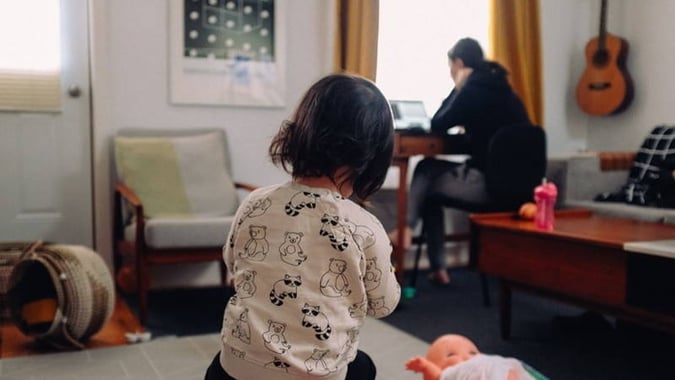
Supporting the return to work after Parental Leave

Returning to the workplace after parental leave can be a daunting time: many parents will remember shuddering at the idea of having to add paid work to the juggle that homelife becomes with the arrival of children. Plus, the worries of “fitting in” again, after being out of the pipeline for so long.
Even from an employer’s perspective, there can be concerns about how the return will go: it’s an unknown for many. But the benefits of strong parental policies are plentiful: the retention of skilled and experienced staff is much more cost-efficient than the recruitment and on-boarding of new employees. In addition, a positive approach to parental leave helps to attract top talent as an employer of choice.
Helping people return to work after parental leave doesn’t have to be difficult-with the right support and policies in place, the transition can run smoothly.
Returning to work: my story
In March 2021, I came back to work at Six Degrees after an extended parental leave of 21 months. The disruption caused by the year that was 2020 along with having an (almost) FIFO husband meant that a faster return wasn’t going to work for our family.
The time I had at home with my son was special for all the reasons everyone expects, even if it did come with some unexpected complexities (aka lockdowns).
More so than the transition back to work, my biggest concern after close to 2 years out of the game, was whether or not a return to work was even logistically possible for the following reasons:
I live 40km from the office (1hr+ commute each way)
I’m solo parenting for up to 3 weeks at a time, and have no local family and support network
I had pretty much forgotten where the office was!
However, working for a business that has a family-first ethos, meant that I didn’t need to worry.
What support can be offered to people returning to work after parental leave?
1. Keep in Touch Days
Six Degrees has a modern and thoughtful parental policy, which includes 10 “keep in touch” days while officially on leave (in addition to Paid Parental Leave*). For me, this meant a train ride into the city (alone = amazing!), a city-quality coffee (wahoo!) and a long overdue catch up with teammates: getting up to speed on all that I’d missed both from a business and personal perspective. I also managed to make it to a couple of company events and strategy days during this time, which was invaluable in making me feel included.
* Six Degrees’ parental leave policy includes primary and secondary caregivers, same sex and de facto partnerships, and adoptions.
2. Parenthood Days
I thought it was a myth that kids got sick on a weekly basis when embarking on their childcare journey (it can’t be that bad, right?!), but I was quickly proven wrong. Childhood ailments are brutal and rife, and care centres seem to be the best breeding ground of all. Fortunately, we are gifted five additional paid leave days that can be taken during the primary caregivers’ first year back in the workforce, should the child(ren) be unwell and unable to attend care. This has been a lifesaver for me, allowing me to prioritise looking after my son when he needs me the most.
3. Flexible, Hybrid Working Model
Six Degrees Executive’s evolution to a hybrid working arrangement has been designed to offer flexibility to all. We are encouraged to create our own balance, working when and where we are most productive. For me, this has resulted in working 1 day in the office, and 1.5 days at home each week. This way I have the best of both worlds: a happy balance of working from home and office-time (which lets me flex my social muscles again finally!), as well as reducing the time spent commuting.
Further to this, there is even talk of me spending an extended time interstate (where my husband is working) later this year, which has been supported by the business. This is all aided by our business’ investment in technology, which enables us to access the systems and tools we need anywhere, anytime, meaning remote working is no longer the “discretionary” benefit it traditionally was in the recruitment sector.
4. Employee Assistance Program
Having an Employee Assistance Program (EAP) is an amazing way of providing confidential and professional psychological support to anyone in the team who may need assistance – for any reason. The struggles that come with being a new parent during the time of a global pandemic are real and knowing that at any time I was able to speak to someone in complete confidence was really reassuring.
In 2020, Six Degrees extended the EAP to include immediate family and household members, which has been extended for 2021.
5. Support from Business Leaders
More important than any formalised policy, is the unwavering support that leaders can give to a returning employee. I had a phone call from our CEO within a few days of giving birth, and regular check-ins from many others across the business during my time away. I have been told on numerous occasions since my return to only “do what you can do”, and it has been emphasised throughout the last six months that my priority should be my family. This personal and caring approach has given me 100% confidence that I am supported in my return, and that the business cares.
Overall, the first six months back at work have been both challenging and rewarding. I have loved getting back into life with the SDE family, reinvigorating my appetite for learning, and I won’t lie: the increase in adult conversation has been pretty good too!
Six Degrees is proud to have a 100% return to work rate after parental leave, and a National Employee Engagement of 85%. Learn more about Life at Six Degrees.
For more information download Fair Work’s Best Practice Guide to Parental Leave.
Related


Developing a Career Plan
Just as any successful organisation meticulously crafts a clear and strategic business plan to...

What to expect when meeting a recruiter for an interview
Meeting with a recruitment consultant is an opportunity to demonstrate how you will present for a...


 Accessibility
Accessibility